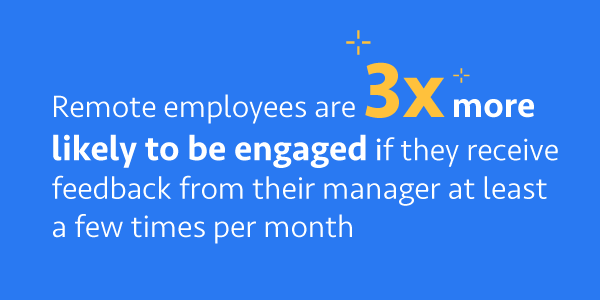It’s predicted that by 2027, the majority of the US workforce will be working remotely. The number of those with flexible working arrangements is also growing faster than the overall US workforce, at roughly 3x the rate.
More companies are hiring and realizing the potential that remote work can offer. Despite nearly a quarter of workers already having the capability to work remotely, this trend has only accelerated in the last year, leaving many employees — and their managers — working from home and separated from each other for the very first time.
So how do you as a leader ensure that your remote employees feel connected and supported, are being adequately trained, and can see the value their remote training or upskilling has for their career?
You need to modify your current methods of communication, training, individual evaluation, and facilitation of company culture to accommodate your remote workers in order to continue to nurture talent from within your organization.
EBQ has a wealth of experience and can provide assistance in this area, having successfully trained our remote employees in B2B Sales, marketing, customer experience, and more.
Remote Team Communication
There’s no such thing as overcommunication. This was true for working in the office, and even more so for communicating with remote employees.
You and your team need to keep a correspondence and stay in the loop with one another in order to answer questions, address issues, have a clear look at projects, and troubleshoot any technological problems that might crop up when working remotely.
Things are changing very quickly, and even connecting with your remote team in a group bi-weekly meeting helps to ensure that everyone knows what’s going on and where things are currently headed.
Without the ability to do these things in a remote setting, training and general workflow will be hampered by constant roadblocks.
To make this easier, it’s vital that you and your teams take advantage of instant messaging and videoconferencing platforms like Slack, RingCentral, Microsoft Teams, and Zoom to make remote training opportunities even more accessible and interactive in real time.
These multifaceted apps have the opportunity to improve your remote training sessions on multiple levels:
- Leaders: Communicate and share screens with remote employees to provide guidance.
- Employees: Communicate and share work with leaders to ensure you’re on track.
- Documentation: Record sessions so individuals can refresh or get clarification on a certain subject.
- Company Culture: Provide a platform for camaraderie and open communication.
With our business being fully-integrated with cloud communication prior to 2020, EBQ was particularly well-positioned to continue collaborating and providing our services while simultaneously adjusting to a completely remote workforce.
We can’t stress the importance of facilitating team communication enough, especially in the context of upskilling remote employees.
Training Remote Employees
Now that your employees are working remotely, both your approach to training and the materials you incorporate into it should be modified to accommodate remote workers.
The most vital element of all of this is that you ensure that all forms of training you had in-office are made available and are adequate for your remote workforce.
One-on-one position training, upskilling, and promotion training — whether lateral or upward — should all be made easily available to your remote team members whether you’re building and training a sales team or a remote multi-faceted marketing team.
At EBQ, we continuously train our team members both through one-on-one position training and project-specific training. We offer classes for employees to get promoted in their discipline as well as training to move into other disciplines, as part of our “Chutes and Ladders” program.

The opportunity for career development facilitates team morale, and employees who have role-specific training available stick around. This applies to engaging remote employees as much as traditional employees.
To ensure your remote employees retain knowledge and see the value it provides to their role, it’s important that your modified training materials possess three specific qualities:
- Simple to understand
- Easy to access
- Relevant to specific roles of remote employees
You might have your trainers create on-demand, easy-to-access webinars on training topics themselves; a lot of these materials already exist though, and they’re free.
There are instructional YouTube videos that can assist you in training your team on subjects like the sales funnel, buyer’s journey, SEO, marketing automation, WordPress, and countless others. We cover many of these B2B sales and marketing topics on the EBQ blog, which you can also access for free to share with your team.
Whether you choose to go this route or create your own videos for training, it allows your remote employees to pause, go back, and fully absorb and understand the material.
Assessing Remote Employee Comprehension
It’s unrealistic to expect remote employees to master any material you provide them with if all you do is send a link to a webinar; more direction is required to successfully facilitate remote training or upskilling.
For each instructional video session, webinar, or interactive training your remote employees complete, it’s essential that leadership also provides their remote teams with the following:
- Clear, specific expectations used to gauge comprehension
- Post-training evaluation and feedback
- Continued on-demand upskilling
- Additional assistance where necessary
The simple solution is to create the necessary tools to evaluate your remote team members. By providing them with quizzes, worksheets, or other interactive materials that can be accessed and submitted remotely, it’s easier to get a grasp of where your remote employees are in any given training or upskilling process.
If you find that any employee performs below expectations in a given training or exercise, it’s important that you also have defined expectations and an evaluation process to follow up with them to make this clear.
This can be squared away in virtual meetings according to need or at a regular cadence with leads and project managers to ensure any lingering questions are answered and misunderstandings of workflows or processes are quickly remediated.
Nurturing Company Culture Remotely
With a sound form of virtual communication, simple and easy-to-access training materials, and an adequate form of post-training assessment all in place, it’s important to make sure all of these elements are combined to help individual team members and company culture grow.
That’s what your remote employees are looking for after all. In addition to a shift to more remote work, the workforce itself has shifted to become more interested in learning and skills advancement rather than stability. That’s why it’s essential that companies make training part of each remote employee’s defined growth path in their career.
When your employees can see the next steps in their career path within the company, they’re more engaged and more willing to learn what you need them to learn.
In fact, according to Gallup, remote employees are 3x more likely to be engaged if they receive feedback from their manager at least a few times per month. With regular feedback and role-specific training, remote employees tend to stick around.

This is why position training and upskilling are crucial to your remote employees. If you’re finding it difficult to devise more specific and effective ways to train and engage your remote employees — just ask them.
Set time aside, schedule one-on-one’s and position training; by inquiring about what would make your remote workers feel more confident and engaged in the company, you set yourself up for a healthier company culture.
Empowering Remote Teams
Creating the infrastructure to train remote employees doesn’t happen overnight. It takes a concerted effort at all levels of your organization to iron out effective modes of communication, on-demand training materials, and adequate evaluation for remote team members.
It’s important that businesses take whatever steps they can in this direction though; with the way the B2B world is shifting, having specialists who are fully-trained to tackle remote work are a huge boon to any organization.
If you find your organization isn’t currently well-structured to engage and train remote employees in order to continue achieving business goals, or the cost to do so is prohibitive, EBQ can provide outsourced sales and marketing specialists with all the necessary tools to work remotely on your behalf.
When you partner with EBQ, you will have specialists at your disposal that come trained with a high degree of expertise in working remotely. Reach out to one of our specialists to start growing with EBQ today.



